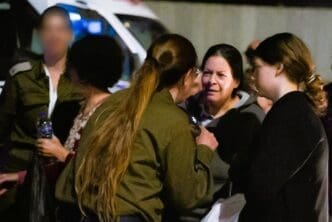For 65-year-old Keith Siegel, the ordeal of captivity in Gaza has ended, but his fight to bring others home has just begun. After months of confinement under grim conditions, the American-Israeli returned to Israel with a singular focus: ensuring the freedom of those still held.
Keith Siegel, a dual national from Chapel Hill, North Carolina, endured 15 months of captivity after being taken by Hamas militants during a violent raid. His experience mirrors the harrowing accounts shared by the families of the estimated 75 hostages who remain. Siegel’s capture occurred at the Kfar Aza kibbutz, a site of significant violence during the October 2023 attack, during which Hamas killed approximately 1,200 people and took many hostages, of whom about 75 still endure confinement in Gaza.
Upon his release, Siegel, who spent much of his time isolated and under harsh conditions, expressed a longing to aid in the liberation of other captives. His brother, Lee Siegel, recounted how Keith was kept largely in the dark about the outside world, relying on brief snippets of radio or television reports for news. Keith’s resilience was bolstered by his meditation practice, which helped him endure the long months of isolation.
Meanwhile, Aviva Siegel, Keith’s wife and also a former hostage, described the family’s relentless campaign to raise awareness and secure the release of all captives. This effort involved extensive travel and discussions with anyone willing to listen, demonstrating the deep commitment of the families involved.
The tenuous peace resulting from a ceasefire agreement between Israel and Hamas facilitated the release of hostages like Keith. However, the future of this ceasefire remains uncertain and subject to ongoing negotiations. Thus, the families of those still detained continue their advocacy, pushing for a sustained effort to ensure all hostages’ safe return.
One such advocate, Meirav Leshem Gonen, whose daughter Romi was also recently freed, highlighted the long-term impacts of captivity. Romi, who suffered a severe hand injury during the initial attack, faces a prolonged recovery. Her mother detailed Romi’s physical and psychological challenges, including significant weight loss and the struggle to reintegrate into normal life.
The personal stories of released hostages underscore the ongoing humanitarian crisis. Estimates suggest that over 47,000 Palestinians have perished in Gaza during the conflict, with significant civilian casualties. The complex dynamics of the ceasefire and the humanitarian aid efforts shape the broader context within which these hostages’ stories unfold.
As the release of additional hostages is anticipated, the campaign to maintain public attention and pressure on the negotiating parties remains critical. Families like the Siegels continue to emphasize the importance of international awareness and advocacy to ensure the extension of the ceasefire and the eventual safe release of all captives.
The resolve of former hostages and their families serves as a powerful reminder of the ongoing struggles faced by those still in captivity. As negotiations progress, the efforts to bring every hostage home underscore a deep commitment to justice and humanity.








